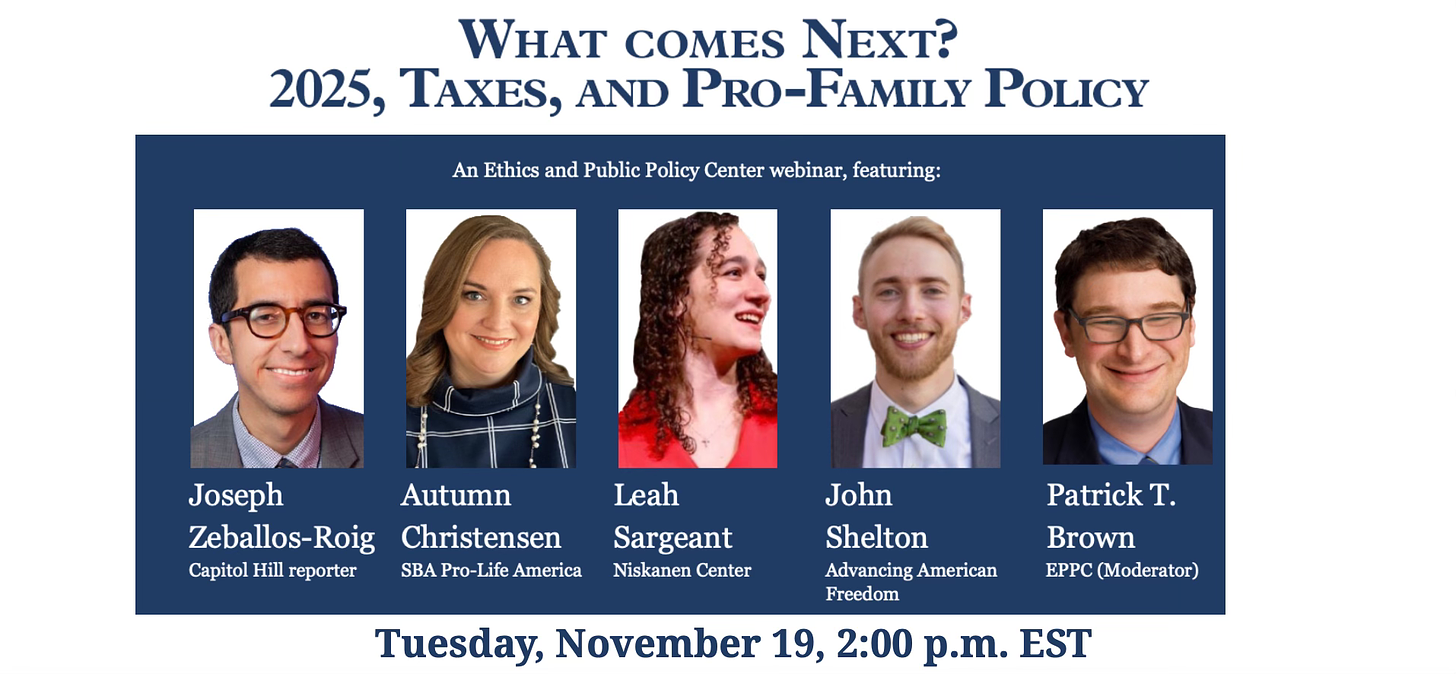The "Had Enough" Election
Voters may or may not have voted for Trump. But they decisively voted against progressivism.
Welcome to Family Matters. On tap:
The Main Event: The backlash against progressive governance arrives
Florida!!!: It’s one hell of a drug
Remember, Remember the 19th of November: A full day of family policy #content
It’s Me, Hi: Newsweek and American Compass
Quick Slants
The Main Event
The best part of being pessimistic is being proven wrong. In this space last week, I previewed the down-ballot initiatives facing voters, predicting those “amendments will, I suspect, be interpreted as evidence for a secularizing, increasingly socially progressive country, with perhaps some backlash on the drugs and crime front.”
And lo, what backlash there was. Former President/President-elect Donald Trump swept the seven battleground states. Voters around the country had clearly had enough of the inflation and cultural tone-deafness of the Biden years, and Harris (deliberately?) didn’t do anything to distinguish herself from the incumbent administration. But he especially over-performed in northeastern states where progressive governance has overshot the mark, suggesting an electorate fed up with blue state solutions that don’t seem to solve much of anything.

Trump came closer to winning New Jersey (a 5.1 percentage point deficit) than his opponent came to winning Arizona. Take Trump’s birthplace in Queens, which gave him 38 percent of their vote, up from 22 percent in 2016. His surprise appearance in the Bronx during his campaign helped triple his vote share compared to 2016 at 27 percent.
The Atlantic’s Derek Thompson chalked the drubbing up to a “second Covid election,” noting the massive red swings in urban areas. On top of the New York shift, he notes, the counties home to Orlando, Miami, Dallas, and Chicago all saw double-digits shift to the right. Philadelphia, Detroit, Houston, and San Antonio saw rightward shifts of five points or more.
That’s possible. But the backlash was more than just Trump, it was on basic questions of law, order, and civic hygiene. You won’t a better first-person explanation of failed big-city progressivism than from frustrated Democrat on his Very Serious Substack:
You should read all of Barro’s piece, including its killer kicker.1 As I wrote in my election recap for American Compass, Democrats’ inability to avoid slipping into the patois of the graduate school seminar on intersectional identities is what killed them nationally. Their inability to deliver a quality-of-life agenda may be killing them locally. Put together, it’s a deadly combo.
The backlash was widespread; just look at the results of law-and-order ballot initiatives this week. As the Manhattan Institute’s pointed out, the movement to legalize anything that can be smoked or snorted may have met its high-water mark this week as well. It wasn’t just Florida (despite $150 million going into the legalization campaign) and both Dakotas voting down legalized marijuana. Massachusetts voted not to become the third state to legalize the possession and use of psychedelic substances. Arizona voted to crack down on homeless encampments, drug dealing, and sex trafficking. California passed a measure to strengthen prosecution of theft and drug-related crimes. Colorado clamped down on early parole and bail, while approved an increase in funds to hire more police officers. Progressive prosectors in Los Angeles, Oakland, and Tampa lost re-election.
“We are happy to be a generous nation,” Lehman writes. “We are, arguably, the most generous nation on Earth. But we are uninterested in being hectored for not wanting to be generous to those who take advantage of that generosity. We want to live in a society where people follow shared rules, not where dysfunction is taken as something worth protecting, even celebrating.”
As Rafael Mangual, also of the Manhattan Institute (the think tank that, more than any other, is positioned to offer a compelling, center-right prescription for addressing urban disorder and promoting good governance) suggested, 2024 can be read as a signpost for the upper limit of how much disorder voters were willing to tolerate in the name of “equity” and “reform.”
In other words, it turns out that “mind your own damn business” (the most grating and anti-communitarian applause line of any recent campaign) does have a breaking point, and perhaps it’s when the streets of far too many major American city smells like weed. If you want a pro-social, pro-family city or locality, you have to take these concerns seriously.
Date nights are harder when you have to worry about getting accosted or mugged. Parents are naturally reluctant to take their kids to baseball games or downtown farmer’s markets if they’re worried about having to explain why some grown-up think it’s okay to pee in public or shout at strangers. One of the reasons for the exodus of families from big metro areas that analysts like EIG’s Connor O’Brien have spotlighted wasn’t just the Covid lockdowns, it was the chaos that erupted in the summer of 2020 and thereafter.
Public disorder and quality of life challenges affect everyone, and in 2024, the pendulum clearly swung towards a more pro-social America. Whether progressives are willing to learn that lesson, along with the others taught on Tuesday night, remains an open question.
Florida!!!
The other big news out of the Sunshine State Tuesday night was the defeat of Amendment 4, which would have wiped the state’s six-week abortion ban off the books. It was the biggest win for the pro-life movement since Dobbs; Nebraska and South Dakota also fought off abortion rights referenda, making for some decent results for the pro-life cause. (Avoiding defeat in Missouri, where a closer-than-expected margin wiped abortion restrictions off the books, would have been turned a good night into a great one.) On the other end of the age spectrum, West Virginia narrowly passed a measure enacting a ban on assisted suicide, another boost for those who advocate for greater respect for life at all stages.
Pro-life optimism should be somewhat held in check. Without the 60 percent threshold to change the state constitution, the measure would have passed, and Florida pro-lifers were outspent by a ratio of roughly 11 to 1. Which makes the bold stance Gov. Ron DeSantis took all the more deserving of the thanks and gratitude of every pro-life activist in the country. With an eye towards his political future, he could have taken the route of quiet endorsement or apathy, the way so many other national Republicans did. Instead, he exerted significant political capital.
The pro-life cause will never have the support of elite donors, big business, or Hollywood celebrities. As such, political figures wiling to use their bully pulpit to push back against misinformation or highlight sound exceptions may be the only way to offer a competing narrative. Gov. DeSantis, as he has in many other aspects of competent conservative governance, provided a model for other red state governors to follow.
Remember, Remember the 19th of November
Family Matters readers, you won’t want to miss this: we’ll be hosting a post-election webinar Tuesday, Nov. 19, at 2:00 p.m. ET, as part of a whole day of can’t-miss events.
The webinar, entitled “What Comes Next? 2025, Taxes, and Pro-Family Policy,” will feature a conversation with long-time Capitol Hill reporter Joseph Zeballos-Roig on the players, prosepcts, and pitfalls of tax policy in 2025. It will be followed by a conversation among leading pro-life, pro-family voices offering different perspectives on what sort of measures might be most likely to be on Congress’ plate next year:
Autumn Christensen, vice president of public policy for Susan B. Anthony Pro-Life America,
Leah Libresco Sargeant, senior policy analyst at the Niskanen Center, and
John Shelton, policy director for Advancing American Freedom
I’ll be there, making sure the trains run on time. I am biased, but I think anyone curious about the future of pro-life, pro-family efforts in the Trump II era will want to turn in. Register here.
Pre-game our post-election webinar with an event hosted by the American Enterprise Institute on marriage penalties, featuring Brad Wilcox, Nik Dunn, Erik Randolph, Angela Rachidi, Josh McCabe, Matt Weidinger, and Kevin Corinth. More info here.
And then, for a nightcap, don’t miss the debate between AEI’s Scott Winship and Oren Cass of American Compass on whether Americans are better off now than they were in recent decades. More info here — kickoff at 5:30 p.m.
With a triple-header like this, we essentially need the College Gameday crew to come out to EPPC for the day — maybe Lee Corso could slap on some Cass or Winship headgear.
It’s Me, Hi
As part of Newsweek’s election night wrap-up, my short take was that we shouldn’t have been surprised that whether by vox populi or vox Dei, America hadn’t seen the last of Donald John Trump:
“The Democrats have proved themselves unable to adjust to the predominant political dynamic today—an ongoing realignment along educational lines. Their inability to drop the lingo of the college campus and take working-class voters' concerns seriously was his gain, and former—and future—President Donald Trump will remain the main character in our collective political dramas throughout his second term in office.”
For American Compass, I offer some longer analysis on how why the 2024 election showcased educational polarization and offered a referendum on both progressive style and substance, as well as why “conservative populism” offers promise and peril in a second Trump term:
“There are still many in the party who interpret “populism” as cover for obnoxious social media spats, to be used as cover for indiscriminate cuts to social spending or deficit-busting corporate tax cuts. If that agenda wins the day during Trump’s second turn, it will leave its new voting base disappointed. But a conservatism with populist characteristics could meet voters where they are.”
Quick Slants
identifies Trump as the President for a post-Christian America (and, I’d add, an increasingly post-Christian conservative movement)
What would Congressional Democrats’ priorities be on abortion? Per Julianne McShane, they’d include providing federal money to ensure access to abortion “without limits” and repealing the Hyde Amendment, among other things (Mother Jones)
N.Y. State Sen. Andrew Gounardes has proposed an $1,800 payment to parents on Medicaid during the third trimester of pregnancy as an anti-poverty measure — interestingly, progressive organizations have traditionally opposed payment during pregnancy for fear of getting caught on the wrong side of abortion debates (Julia Rock for New York Focus)
In Oklahoma, Gov. Kevin Stitt announced he is creating a new Office of Faith-Based Initiatives
Ballot measures to fund child care intiatives passed in Austin and Sonoma County, California, and failed in St. Paul, Minnesota (EdSource)
My EPPC colleague writes for Public Discourse about what IVF debates can and should tell us about personhood
Send me a postcard, drop me a line, and then sign up for more content and analysis from EPPC scholars.
“One grim irony about the political cost of this promise is that, of course, the federal government that only got seven electric vehicle charging stations built in two years has performed zero transgender surgeries on detained migrants. That’s the Democrats in a nutshell: the party that promises trans surgeries for illegal immigrants but doesn’t deliver them.”








